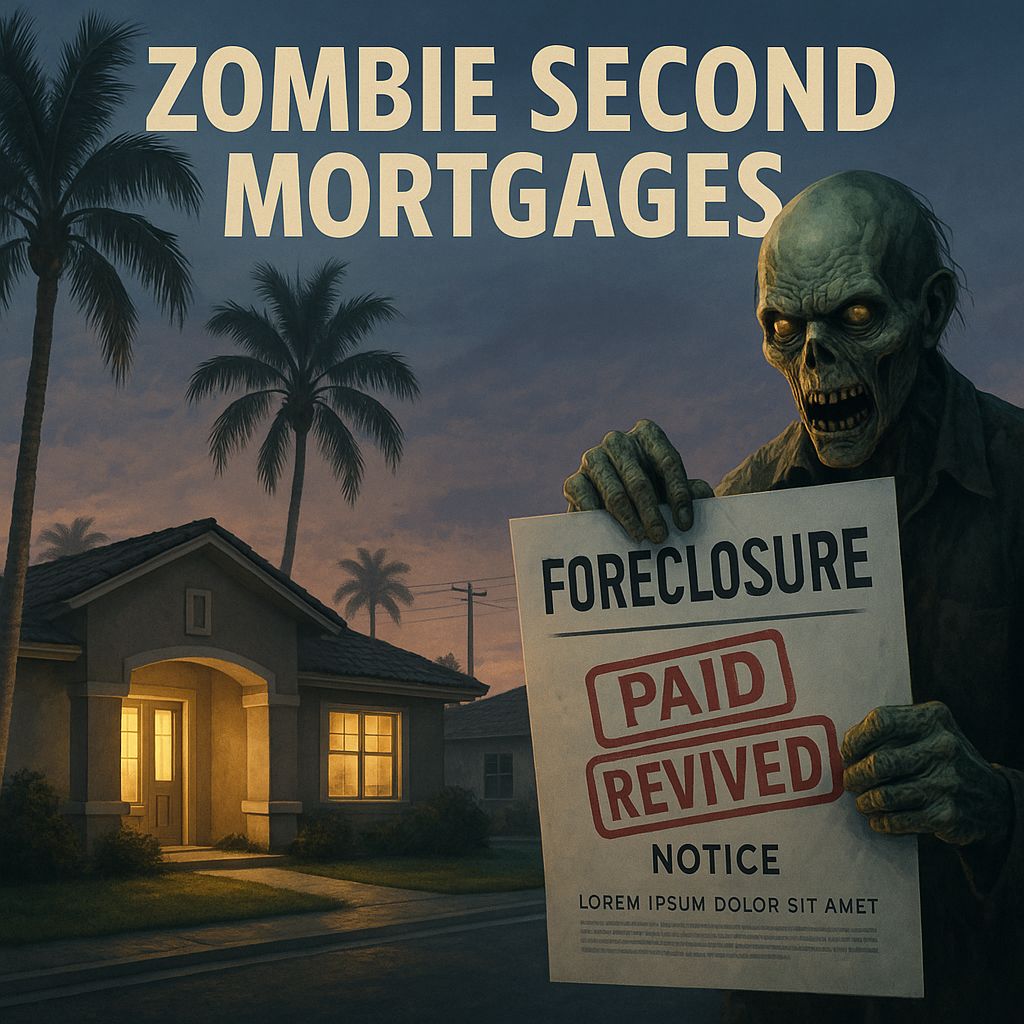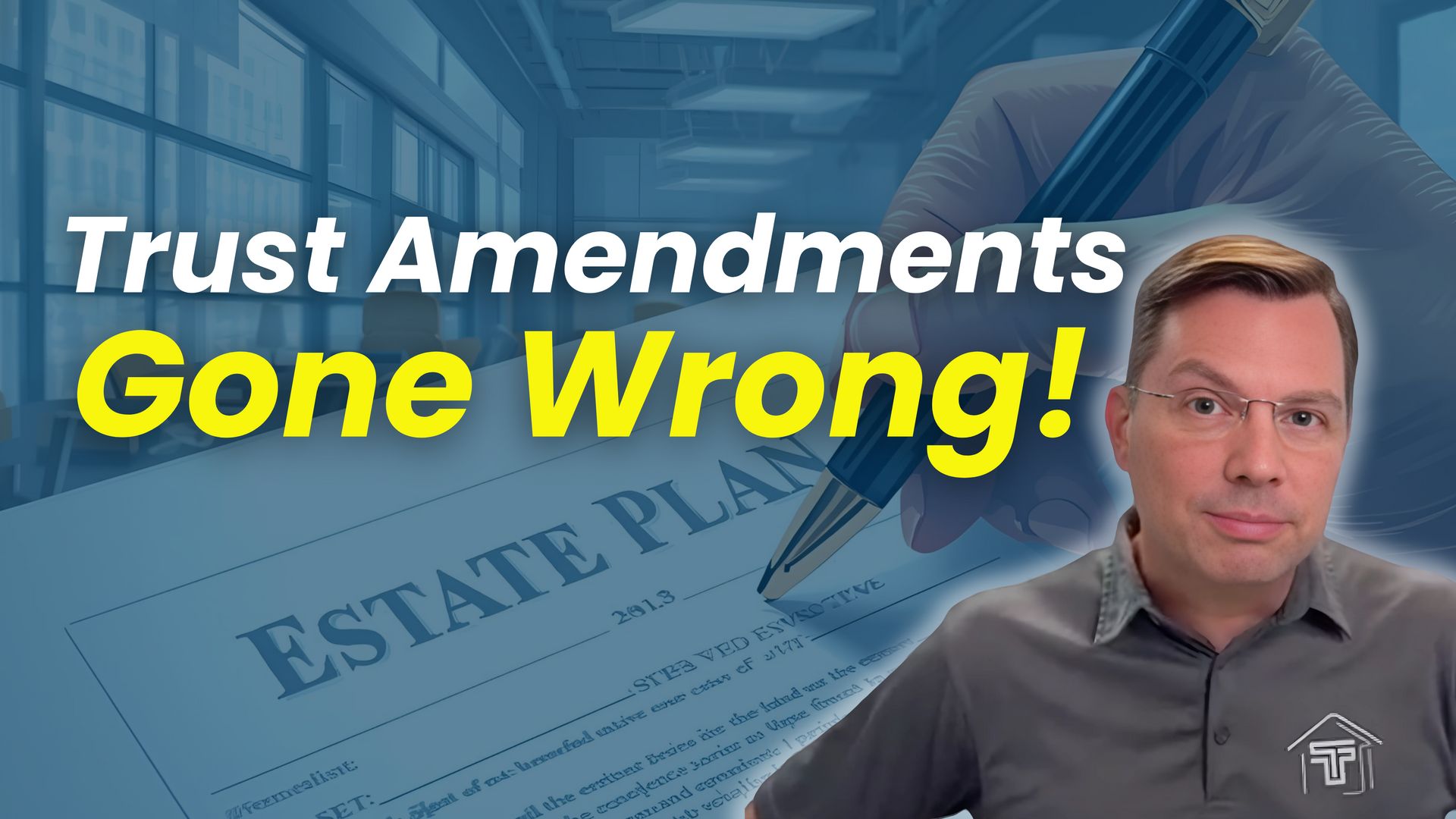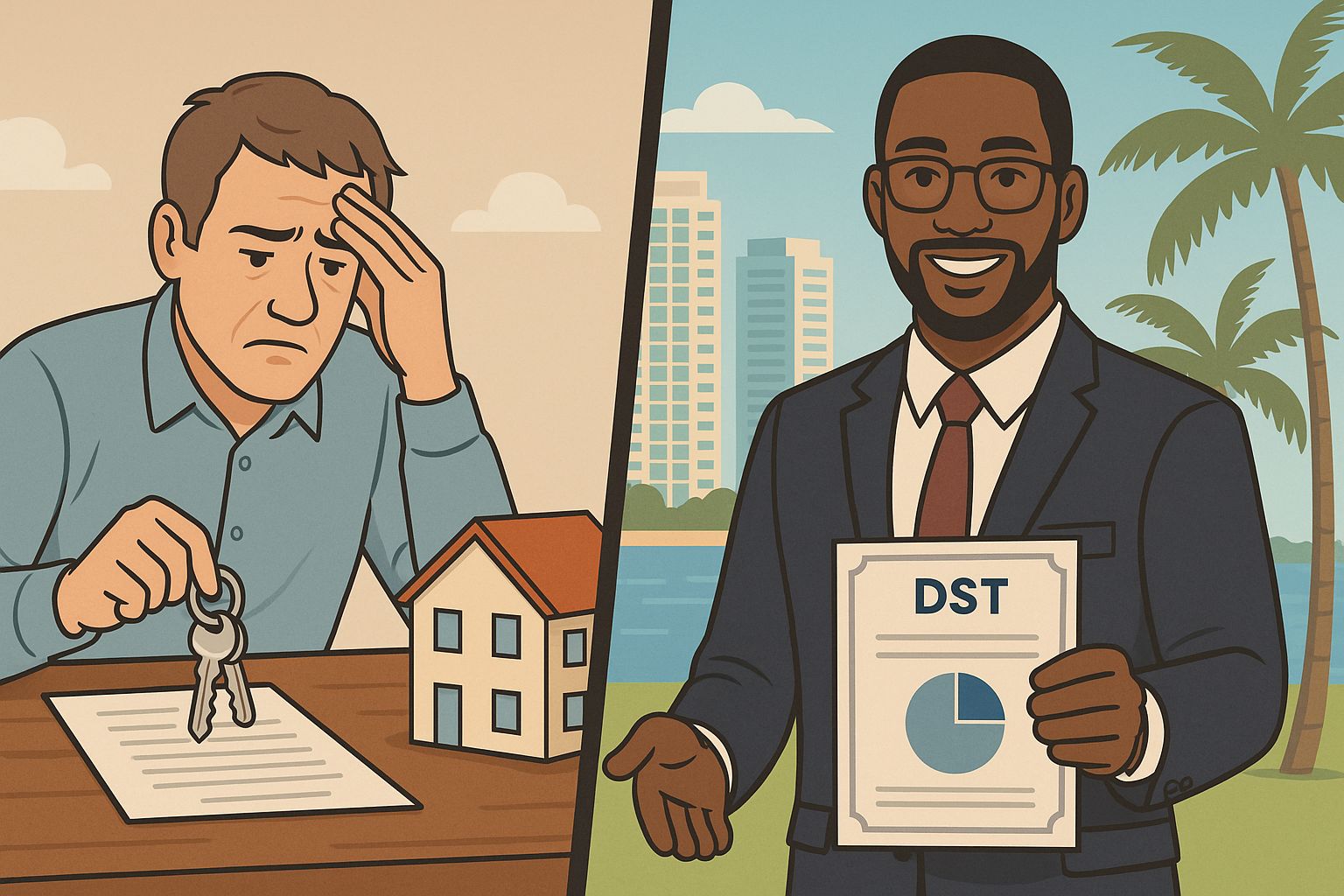Trust This.
By Joseph E. Seagle, Esq.
Happy 1031 Day and Happy 👻 Halloween 🎃 ! May your day be full of treats and no tricks.
❗Situation Awareness: The Fed dropped its lending rate again this week by a quarter point, but Jerome Powell made clear that a future cut in December is not a sure thing. He pointed out that inflation and unemployment are both rising (stagflation), so lowering the rate will juice inflation, putting the Fed in a precarious spot.
1 big thing: Zombie second mortgages rise again, and D.C.’s watchdogs are off-duty

A decade and a half after the housing crash, more than $32 billion in canceled or charged-off second mortgages are being revived by debt collectors, and federal oversight has largely vanished.
What’s happening: Bloomberg’s latest investigation finds that these “zombie” loans are resurfacing in states like Florida and California, where home equity has surged. Many homeowners believed their second mortgages were forgiven, especially after receiving IRS Form 1099-C notices declaring the debts canceled. Yet collectors are foreclosing on homes anyway, sometimes decades after the fact.
No cop on the beat: The Consumer Financial Protection Bureau (CFPB) had been preparing cases against at least three servicers — Veripro Solutions, Specialized Loan Servicing, and FCI Lender Services — for violating federal debt-collection laws before the Trump administration gutted the agency’s staff and halted investigations in early 2025.
Economists and former regulators warn that the CFPB’s paralysis leaves borrowers defenseless against unlawful collection tactics. “There should be someone on this watch,” said economist Douglas Holtz-Eakin, emphasizing that the absence of enforcement encourages abusive practices.
Florida, where firms like Miami Beach–based ARCPE Holdings already drew scrutiny for resurrecting canceled loans, remains a “hotspot” on Bloomberg’s national map of zombie debt assignments.
How it hits home: Borrowers often learn of these debts only when foreclosure notices arrive. One Illinois father was told to pay $29,000 on a loan he hadn’t heard about in 15 years. A California contractor lost his home to foreclosure despite having a 1099-C showing that the debt was canceled in 2009.
Even homeowners who fought back, such as Virginia’s Roy and Danielle Brown, faced massive back-interest claims until courts intervened. Their class-action suit led to a preliminary settlement that erased thousands of dollars in unlawful charges and paused foreclosures for borrowers nationwide.
Why it matters: The Sunshine State’s title agents, lawyers, and lenders face rising risk exposure. Many second liens from 2002–2008 remain unreleased in public records, meaning a property sale or refinance could trigger revived claims. With no active CFPB oversight, Florida homeowners must rely on private lawsuits or state laws, a costly gamble.
The takeaway: Roughly 600,000 “sleeper seconds” could still haunt U.S. homeowners, many concentrated in Florida’s boom-era subdivisions. Until Washington restores consumer enforcement, borrowers and real estate professionals must dig deep into old title records and demand documentation before dismissing a long-forgotten lien. In a housing market already battling insurance turmoil and affordability woes, the undead debts of 2008 have found new life … and new victims.
2. Contract cancellations rise

The U.S. home-purchase market is snapping back in favor of buyers, and that shift matters for your asset-protection, investment, and development strategies. According to a recent report by Redfin, cancellations of home-purchase agreements hit a record high this summer, driven by high mortgage rates, inflation-adjusted home-prices and growing buyer wariness.
Market Reality Check
By the numbers: about 15.1% of contracts were canceled in August 2025 nationwide, the highest August cancellation rate on record. In July, 15.3% of contracts fell through (58,000 homes), up from 14.5% a year earlier.
Florida is among the hardest hit: in major metros such as Orlando, Tampa, and Jacksonville, cancellation rates surpassed 19% in several cases.
Driving factors: buyers have more inventory, less urgency, higher financing costs, and greater scrutiny of inspections and repair issues. Among survey responses by Redfin agents: ~70% of cancellations trace back to inspection or repair issues; ~28% to financing falling through.
Implications for Florida Professionals & Entrepreneurs
Investment deals: For those in private lending, real-estate syndication, or development, rising cancellation rates signal increased deal risk. Structures should account for higher fall-through potential (contingency caps, stronger earnest money, inspection windows).
Practice real-estate/office leases: If you’re acquiring or refinancing property (for your medical, legal, or professional services practice) anticipate longer approval/closing cycles; insist on financing commitments and pre-inspection diligence.
Seller mindset: Florida sellers (home-owners, developers) must recalibrate expectations—what worked in 2021-22 (multiple offers, rapid contracts) is not reliably viable now. Price realistically, be concession-ready, and vet buyer financing early.
Asset-protection angle: For clients holding Title or land-trust structures who plan to sell or reposition property, document the condition proactively (inspections, insurance risk) and model fallback scenarios if a sale falls through or delays. Florida’s higher insurance/HOA costs and climate-risk exposure exacerbate buyer caution.
Title agents: Watch staffing and expenses as cancellations eat into revenue.
What to Watch Next
Mortgage rates: If rates drop meaningfully, canceled-deal volumes may decline, and buyer urgency could rebound.
Inventory & listing time: Continued excess supply → buyer leverage persists; if supply tightens → sellers regain some strength.
Florida-specific risks: Hurricanes, insurance premium spikes, association claims—all factors intensifying buyer hesitation on Florida real estate.
Lender/financing pipeline strength: If financing resolves faster, fewer deals will collapse due to loan failure.
Takeaway: For Florida-based professionals and business owners operating in the real-estate, lending, or practice-property space: cancellations hitting record levels mean risk is higher and buyer power is greater. Whether you’re structuring investments, acquiring property for your practice, or advising clients on dispositions, you must build resilience into contracts, conduct more rigorous due diligence, and assume the possibility of a deal falling apart—even once under contract.
Act now by reviewing your contract templates, tightening inspection/financing protections, and recalibrating pricing and expectations in your Florida market.

3. DSTs: the 1031 off-ramp

Investors who want to exit actively-managed rental properties without taking a big tax hit often face a tradeoff: keep the property and the management headaches, or sell and pay capital gains and depreciation recapture taxes. Using a Delaware Statutory Trust (DST) as a 1031 exchange replacement allows investors to defer taxes while entrusting management to a sponsor.
What’s new: The IRS recognized certain multi-owner DST structures as qualifying replacement property for Section 1031 in Revenue Ruling 2004-86 — so a taxpayer can trade real property for a beneficial interest in a properly structured DST and still defer gain, provided the other 1031 requirements are met. That ruling also limits what trustees/sponsors may do after funding (the restrictions that make DSTs passive).
Key takeaways
DST interests can qualify as like-kind replacement property under Revenue Ruling 2004-86, but only when the DST follows the ruling’s structural rules.
Investors trade active management for passive ownership: you get cash flow and depreciation allocations without landlord chores — but also limited control and liquidity.
Standard 1031 timing (identify within 45 days, close within 180) and like-for-like value tests still apply; plan identification and allocation carefully if you’re doing multiple replacement properties or fractional DST interests.
Watch exit provisions: some sponsors may force conversions into non-traded REIT structures (UPREIT/OP units) at wind-up, which can terminate future 1031 eligibility and create liquidity/tax timing risks.
Bottom line: For owners who want to stop managing property but keep tax deferral, a DST can be an elegant tool — but success depends on strict DST structure, smart sponsor selection, and careful 1031 planning. Run the numbers, read the offering documents, and check with your Florida real estate lawyer, financial planner, and tax advisor before signing.
Advertisement:
Florida News, Fast and Easy!
Discover why 250,000 Floridians start their day with Flyover Florida! Our quick-to-read daily updates keep you informed on the latest local news, events, and stories that matter most to you. In just a few minutes, you can catch up on all things Florida without the hassle. Stay ahead of the curve and join a growing community that values staying informed, all in a concise, easy-to-digest format!
4. Kaizen: the antidote to analysis paralysis

Our jack-o-lantern of Edward and Rufous paw prints courtesy of Weston Ewart.
Small business leaders often get stuck waiting for the “perfect” plan — analyzing data, overthinking strategy, and delaying action. That hesitation costs momentum, morale, and money. The cure is Kaizen — a Japanese philosophy that means continuous improvement through small, consistent changes.
Why Kaizen matters for leaders
In a world obsessed with big wins and instant success, Kaizen is a refreshing reminder that real growth is incremental. It teaches that perfection isn’t the goal — progress is. For leaders, adopting a Kaizen mindset means:
Empowering action: Encourage your team to make small improvements daily without waiting for top-down approval.
Reducing fear of failure: When the focus is on steady progress, mistakes become data, not disasters.
Building momentum: Continuous movement, even in micro-steps, compounds into meaningful transformation over time.
Move past analysis paralysis
Entrepreneurs often stall because they’re trying to get everything right before they begin. Kaizen flips that script: start small, learn fast, adjust, repeat.
Set micro-goals: Instead of a 12-month overhaul, commit to a one-week experiment. What can you test or tweak now?
Simplify metrics: Track just one key result per initiative to avoid getting buried in dashboards.
Celebrate iteration: Reward progress, not perfection — and make “what did we learn?” part of every meeting.
The mindset shift
Kaizen turns “ready, aim, fire” into “fire, learn, aim, fire again.” That’s how leaders escape the trap of analysis paralysis — by choosing progress over perfection. Ask yourself, “What is the smallest thing I can do right now to move forward?” and then ask yourself what else you can do that is smaller, and smaller, and smaller until you get to the absolute first step you need to take to start moving.
The bottom line: Businesses that grow the fastest aren’t the ones that plan the most — they’re the ones that move the most. Start your Kaizen habit today: one small improvement, every day, from every person. That’s how great companies — and great leaders — evolve.
We hope you found this helpful — any feedback is appreciated and can be shared by hitting reply or using the feedback feature below.
Was this email forwarded to you? Subscribe here.
Have an idea or issue to share? Email us.
Connect with us using your preferred social media and website links for MyLandTrustee and Aspire Legal Solutions.
Our mailing address: PO Box 547945, Orlando, FL 32854-7945
Our physical address: 1901 West Colonial Drive, First Floor, Orlando, FL 32804
Be on the lookout for our next issue! 👋

